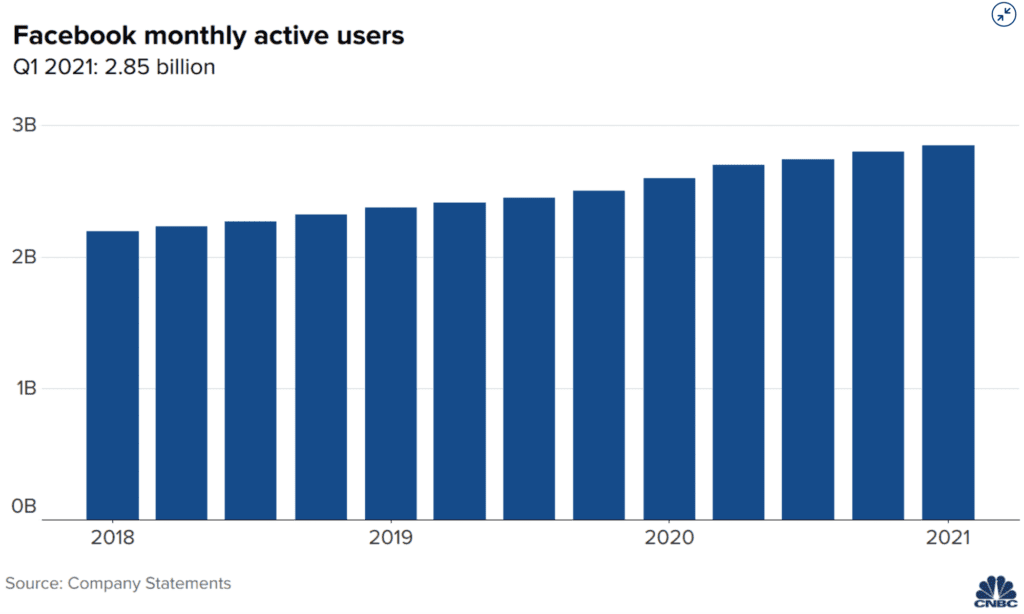Facebook has done it again. On April 28, the company announced quarterly earnings that crushed Wall Street’s expectations, demonstrating a remarkable resilience. Facebook continues to ascend as a premier advertising platform, too, second only to Google in terms of online ad marketshare. Let’s take a closer look.
What Facebook Announced
Facebook’s quarterly results were impressive by any measure:
- Earnings: $3.30 per share vs. $2.37 per share forecast.
- Revenue: $26.17 billion vs. $23.67 billion expected.
- Daily active users (DAUs): 1.88 billion vs. 1.89 billion forecast by FactSet.
- Monthly active users (MAUs): 2.85 billion vs. 2.86 billion forecast by FactSet.
- Average revenue per user (ARPU): $9.27 vs. $8.40 forecast by FactSet.
The increase in active users is key. Demonstrating that it can continue to grow its user base helps Facebook attract more advertisers.
Why Facebook Is Succeeding
Why is Facebook continuing to grow quarter after quarter even amid controversies and threats from legislators and competitors? Here are some reasons:
- Advertisers remain loyal to Facebook. Facebook said its impressive revenue growth came from a 12 percent increase in the number of ads delivered – and a 30 percent year-over-year increase in average price per ad. Even as businesses were being rocked by the pandemic and faced an uncertain year, they were willing to pay more for ads on Facebook. And why not? Social media platforms such as Facebook enjoyed tremendous growth in 2020 as the pandemic drove more people online. Advertisers wisely went where their audience was.
- Facebook is monetizing its user base beyond ad targeting. This is important. By its own admission, Facebook’s ability to deliver targeted ads is being threatened by Apple’s app tracking transparency privacy initiative in which users of iPhones will now need to agree to allow a business to collect information about them – known as an opt-in policy. The world’s largest social network is upset because its advertisers will have a harder time tracking its users off Facebook and serve up personalized ads to them. But Facebook has been steadily finding different ways to monetize its app (and Instagram’s) beyond ad targeting. For instance, in its earnings announcement, Facebook CEO Mark Zuckerberg discussed how the company continues to build social commerce features. And Facebook’s Marketplace service, where users can buy and sell goods, continues to grow. These features keep businesses and people engaged on Facebook, generate more ad revenue for Facebook, and give Facebook a stockpile of first-party search and purchase data to deliver more personalized experiences.
Going forward, Facebook will continue to monetize that user base in creative ways – an example being the launch of several audio features that will generate revenue for creators and inevitably create a more engaged user base – which generates more advertising revenue.
What Advertisers Should Do about Facebook
- Continue to capitalize on tools to help you connect with your audience on Facebook. For instance, as Mark Zuckerberg mentioned to investors on April 28, Facebook launched Shops in 2020 to help businesses more easily conduct online commerce, and there are now more than 1 million monthly active Shops and over 250 million monthly Shops visitors.
- As always, balance your advertising among the major platforms that continue to deliver value, including Amazon Advertising, Facebook, Instagram, Google, and Microsoft Advertising.
- Monitor expected privacy legislation and the impact of Apple’s ATT initiative, but don’t overreact. Facebook continues to show a remarkable aptitude for managing threats from competitors and legislators.
Whatever you do, don’t count out Facebook regardless of what you read and hear about the headwinds the company faces. Facebook is not going away. It’s the world’s largest social media network for a reason. Follow your audience and engage with them.
Contact True Interactive
At True Interactive, we help businesses capitalize on social media advertising to build their brands. We can help you, too. Contact us to learn more.

